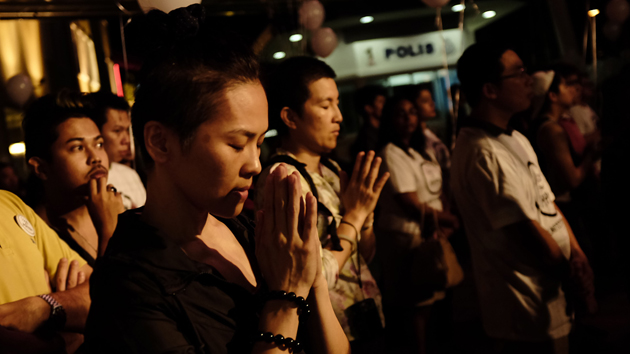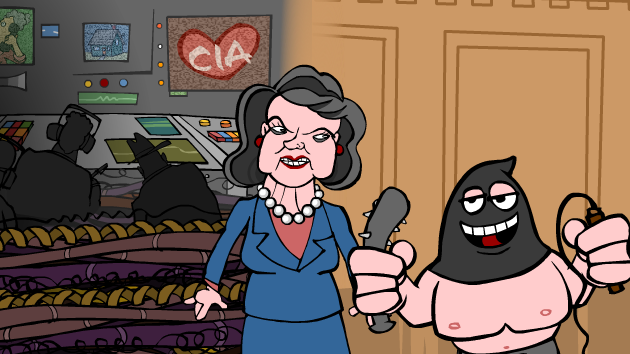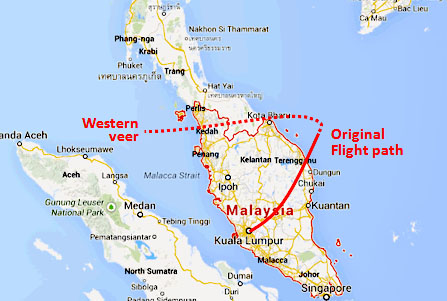
A group of Malaysian people pray during an event for the missing plane. Kamal Sellehuddin/ZUMA
This story first appeared on the TomDispatch website.
Isn’t there something strangely reassuring when your eyeballs are gripped by a “mystery” on the news that has no greater meaning and yet sweeps all else away? This, of course, is the essence of the ongoing tale of the disappearance of Malaysia Airlines Flight 370. Except to the relatives of those on board, it never really mattered what happened in the cockpit that day. To the extent that the plane’s disappearance was solvable, the mystery could only end in one of two ways: it landed somewhere (somehow unnoticed, a deep unlikelihood) or it crashed somewhere, probably in an ocean. End of story. It was, however, a tale with thrilling upsides when it came to filling airtime, especially on cable news. The fact that there was no there there allowed for the raising of every possible disappearance trope—from Star Trekkian black holes to the Bermuda Triangle to Muslim terrorists—and it had the added benefit of instantly evoking a popular TV show. It was a formula too good to waste, and wasted it wasn’t.
![]() The same has been true of the story that, in the US, came to vie with it for the top news spot: the devastating mudslide in Washington State. An act of nature, sweeping out of nowhere, buries part of a tiny community, leaving an unknown but possibly large number of people dead. Was anyone still alive under all that mud? (Such potential “miracles” are like manna from heaven for the TV news.) How many died? These questions mattered locally and to desperate relatives of those who had disappeared, but otherwise had little import. Yes, unbridled growth, lack of attention to expected disasters, and even possibly climate change were topics that might have been attached to the mudslide horror. As a gruesome incident, it could have stood in for a lot, but in the end it stood in for nothing except itself and that was undoubtedly its abiding appeal.
The same has been true of the story that, in the US, came to vie with it for the top news spot: the devastating mudslide in Washington State. An act of nature, sweeping out of nowhere, buries part of a tiny community, leaving an unknown but possibly large number of people dead. Was anyone still alive under all that mud? (Such potential “miracles” are like manna from heaven for the TV news.) How many died? These questions mattered locally and to desperate relatives of those who had disappeared, but otherwise had little import. Yes, unbridled growth, lack of attention to expected disasters, and even possibly climate change were topics that might have been attached to the mudslide horror. As a gruesome incident, it could have stood in for a lot, but in the end it stood in for nothing except itself and that was undoubtedly its abiding appeal.
Both stories had the added benefit (for TV) of an endless stream of distraught relatives: teary or weeping or stoic or angry faces in desperately tight close-ups making heartfelt pleas for more information. For the media, it was like the weather before climate change came along.
In response, just about anything else that could pass for news was swept aside. Given a media that normally rushes heedlessly from one potential 24/7 story to another, this was striking. In the case of Flight 370, for instance, on the 21st day after its disappearance, it still led NBC’s Nightly News with Brian Williams (with the mudslide, one week after it happened, the number two story).
In those weeks, only one other story broke their stranglehold on the news. It was the seemingly critical question of what in the world was going on in Ukraine. There was the Russian military move into the Crimea, the referendum on that peninsula, its annexation, the alarm of the US and the European Union, the imposition of (modest) sanctions, and various warnings of a Russian military build-up and possible invasion of eastern Ukraine. Unlike the other two stories, it seemed consequential enough. And yet in some eerie way, it, too, came to resemble them. It was as if with the news on Ukraine we were being sucked back into another era—that of the superpower-run twentieth century.
The question that seemed to loom was this: Are we in a new (i.e., the old) Cold War? It was so front and center that it sent opinion pollsters scrambling and they promptly discovered thathalfof all Americans thought we were—itself less a testament to American opinion than to the overwhelming media narrative that we were indeed living through theCold War redux.
Was the Soviet Union being raised from the dead? Think of this as the Flight 370 of global political coverage. It had everything a story needed: people in the square; a foreign leader who glowered just like a movie villain should and, for once in the twenty-first century, wasn’t a US president or vice president; and fears of Russian troops entering the rest of Ukraine, with Lithuania, Estonia, or some other former satellite of the Soviet Union next in line. Where would it end? How could Vladimir Putin’s juggernaut be stopped?
As a story, it was a time warp miracle all its own. After so many years, an American president was denouncing not al-Qaeda, or the Taliban, or the Iraqis, or the Iranians, but the Russians. Once again, as in the good old bad old days, US officials could decry the tyranny of a major state and its dangers to the globe with a straight face. There was finally a black-and-white tale of international morality in which Americans could denounce an invasion. It had the comfy familiarity of an old-fashioned script, one whose ending everybody already knew. It implied that the world was once again easy to grasp, that everything was finally back in order—the good guys and the bad guys, East and West, freedom and tyranny.
As an old script, it had all the fearsome charms of familiarity. While signaling danger, it actually helped tame a world that otherwise looked unsettling indeed.
As it happens, however, Soviet armies will never again threaten to plunge through the Fulda Gap. The Warsaw Pact is long gone, never to be revived, and Germany will remain a united powerhouse, not a divided land. Argue as you will about whether the Russians or Putin are “evil,” one thing is certain, there is no “empire” to go with it. President Obama was on the mark recently when he referred to Putin’s Russia as a “regional power” and not a superpower at all. Not even close. If anything, it’s a country that, thanks to NATO, the US, and the European Union, already had its back to the wall, with its former “satellites” long ago stripped away, and Ukraine looking like it was about to go, too. (After all, an American diplomat, talking tough, was secretly recorded seemingly sorting out a future Ukrainian government with the local American ambassador!)
Russia may not even quite be a regional powerhouse. Its economy is shaky and, unlike the Soviet Union, it is now largely an oil and gas state and, worse yet, its energy reserves are expected to be in decline in future decades.
A Planet for the Taking
So, no, Virginia, Flight 370 was not commandeered by aliens and Vladimir Putin is not Joseph Stalin’s younger brother. The US is not in a new Cold War, its troops do not stand in any danger of going toe-to-toe with Russian invaders, and a two-superpower world is dead and buried, but so, it seems, is a one superpower world. History is a powerful tool, but sometimes when lost stories and old scripts dominate the headlines, it’s worth asking whether, behind the scrim of the familiar and the empty, there might not lurk an unnerving world, a new age that no one cares to focus on.
As with a magician, sometimes you have to look where he isn’t pointing to catch sight of reality. With that in mind, I’d like to nominate British journalist Patrick Cockburn for a prize. In the midst of the recent headlines, in the most important article no one noticed, he pointed out something genuinely unnerving about our world.
 Yes, we’re all aware that the US invasion of Iraq didn’t exactly work out as planned and that Afghanistan has been a nearly 13-year disaster, even though the US faced the most ragtag of minority insurgencies in both places. What, however, about the monumental struggle that used to be called the Global War on Terror? After all, we got Osama bin Laden. It took a while, but SEAL Team 6 shot him down in his hideout in Pakistan. And for years, thanks to the CIA’s drone assassination campaigns in the Pakistani tribal borderlands, Yemen, and Somalia (as well as a full scale hunter-killer operation in Iraq while we were still occupying that country), we’ve been told that endless key al-Qaeda “lieutenants” have been sent to their deaths and that al-Qaeda in Afghanistan has been reduced to 50-100 members.
Yes, we’re all aware that the US invasion of Iraq didn’t exactly work out as planned and that Afghanistan has been a nearly 13-year disaster, even though the US faced the most ragtag of minority insurgencies in both places. What, however, about the monumental struggle that used to be called the Global War on Terror? After all, we got Osama bin Laden. It took a while, but SEAL Team 6 shot him down in his hideout in Pakistan. And for years, thanks to the CIA’s drone assassination campaigns in the Pakistani tribal borderlands, Yemen, and Somalia (as well as a full scale hunter-killer operation in Iraq while we were still occupying that country), we’ve been told that endless key al-Qaeda “lieutenants” have been sent to their deaths and that al-Qaeda in Afghanistan has been reduced to 50-100 members.
Yet Cockburn concludes: “Twelve years after the ‘war on terror’ was launched it has visibly failed and al-Qaeda-type jihadis, once confined to a few camps in Afghanistan, today rule whole provinces in the heart of the Middle East.” Look across that region today and from Pakistan to Libya, you see the rise, not the fall, of jihadis of every type. In Syria and parts of Iraq, groups that have associated themselves with al-Qaeda now have a controlling military presence in territories the size of, as Cockburn points out, Great Britain. He calls al-Qaeda’s recent rise as the jihadi brand name of choice and the failure of the US campaign against it “perhaps the most extraordinary development of the 21st century.” And that, unlike the claims we’ve been hearing at the top of the news for weeks now, might not be an exaggeration.
Looked at another way, despite what had just happened to the Pentagon and those towers in New York, on September 12, 2001, the globe’s “sole superpower” had remarkably few enemies. Small numbers of jihadis scattered mostly in the backlands of the planet and centered in an impoverished, decimated country—Afghanistan—with the most retro regime on Earth. There were, in addition, three rickety “rogue states” (North Korea, Iraq, and Iran) singled out for enemy status but incapable of harming the US, and that was that.
The world, as Dick Cheney & Co. took for granted, looked ready to be dominated by the only (angry) hyperpower left after centuries of imperial rivalry. The US military, its technological capability unrivaled by any state or possible grouping of states, was to be let loose to bring the Greater Middle East to heel in a decisive way. Between that regular military and para-militarizing intelligence agencies, the planet was to be scoured of enemies, the “swamp drained” in up to 60 countries. The result would be a Pax Americana in the Middle East, and perhaps even globally, into the distant future. It was to be legendary. And no method—not torture, abuse, kidnapping, the creation of “black sites,” detention without charges, assassination, the creation of secret law, or surveillance on a previously unimaginable scale—was to be left out of the toolkit used to birth this new all-American planet. The “gloves” were to be taken off in a big way.
Thirteen years later, those plans, those dreams are down the drain. The Greater Middle East is in chaos. The US seems incapable of intervening in a meaningful way just about anywhere on Earth despite the fact that its military remains unchallenged on a global level. It’s little short of mind-blowing. And it couldn’t have been more unexpected for those in power in Washington and perhaps for Americans generally. This is perhaps why, despite changing American attitudes on interventions and future involvement abroad, it’s been so hard to take in, so little focused upon here—even in the bogus, politicized discussions of American “strength” and “weakness” which circle around the latest Russian events, as they had previously around the crises in Iran and Syria.
Somehow, with what in any age would have seemed like a classic winning hand, Washington never put a card on that “table” (on which all “options” were always being kept open) that wasn’t trumped. Events in Ukraine and the Crimea seem to be part of this.
The Chinese had an evocative phrase for times of dynastic collapse: “chaos under heaven.” Moments when it seems as if the planet itself is shifting on its axis don’t come often, but they may indeed feel like chaos under heaven—an increasingly apt phrase for a world in which no country seems to exert much control, tensions are rising in hard to identify ways, and the very climate, the very habitability of the planet is increasingly at risk.
When The Losers Are The Winners
Even in a losing game, there are usually winners. One of the conundrums of this particular moment, however, is that the winners in our American world are exactly those who have repeatedly been playing the losing hands. Their reward for one self-defined disaster after another has been yet more money, yet wider areas of everyday life to control, and yet more power. No matter how inept they may prove as imperial players on a world stage, they can essentially do no wrong domestically when it comes to embedding themselves ever more deeply in our lives in the name of our “security” and our “safety.” It’s a remarkable tale. Legendary, one might almost say. As the power of American power to accomplish seemingly anything fades, the power of the national security state only grows.
It’s true that, in the wake of the Edward Snowden revelations, the managers of our secret state have had to pull back in a few areas—especially the gathering and holding of phone metadata for the complete US population. But the significance of this is easy to exaggerate. It’s worth remembering that in the wake of the Watergate era, the last time we went through a round of “reforms” of an out-of-control secret world, the national security state somehow ended up with its own secret court system and secret body of law to which all citizens became accountable even though they could know nothing about it. Four decades later, in a situation in which that secret state is so much stronger, such reforms may once again turn out only to enhance its power.
It’s true as well that the CIA has had to pull back on some of the methods it used to such disastrous effect after 9/11, in particular closing those “black sites” it set up (though some may still exist, possibly in Somalia and perhaps on US naval ships) and on the use of torture. Nonetheless, the recent spectacle of the Agency’s attack on Senator Dianne Feinstein and the staff of the Senate Intelligence Committee over a still-secret 6,300 page critical report on its Bush-era torture and black site programs should be instructive. After all, Feinstein has made her reputation, in part, as the senator from the national security state. She has typically supported the NSA’s secret programs as well as those of other intelligence outfits, straight down the line. There has perhaps been no one more sympathetic among Democratic representatives in Congress.
On a single issue, a single set of programs by a single agency, however, she chose to differ and offer genuine criticism. You might think that, under the circumstances, she would still be handled by the secret state with kid gloves. Instead, the CIA referred her committee staff to the Justice Department for possible crimes, while she was attacked as if she were the Great Satan and finally driven to the Senate floor to denounce the CIA for potential criminal acts and infringing the Constitution. Even the president didn’t come to her aid.
Think of this as a reasonable yardstick for measuring the real power relations between Washington’s official overseers and those who are supposed to be overseen.
Think of the overseen as now negotiating from a position of significant strength the details of their future benefits package. And we can count on one thing: whatever changes are made, they will be largely cosmetic. The many parts of America’s growing shadow government—secret law, secret surveillance, secret power, and the secret state—are here to stay.
From the 9/11 attacks on, that secret state and the militarized world of Washington that goes with it have shown themselves, even by their own standards, woefully incapable of handling a new and puzzling world. Their actions have repeatedly undermined the usual sort of imperial control, instead facilitating spreading chaos. Post-9/11, they have had a remarkable knack for creating not just blowback—the CIA term of tradecraft that scholar Chalmers Johnson put into our vocabulary—but something for which we have no word. Think of it perhaps as just the “blow” part of that term.
The orderliness of secret power in Washington and chaos under heaven, the growth of a police state and a planet run riot, turn out to be two sides of the same coin. If you want a news story that will glue eyes, then think of it this way: on September 12, 2001, the national security state entered the cockpit of (to modernize a phrase) the plane of state, hijacked it, and steered it directly for the Bermuda Triangle—and here was the strangest thing of all: no one even noticed.
Tom Engelhardt is a co-founder of the American Empire Project and author of The United States of Fear as well as a history of the Cold War, The End of Victory Culture. He runs the Nation Institute’s TomDispatch.com. His latest book, co-authored with Nick Turse, is Terminator Planet: The First History of Drone Warfare, 2001-2050.
Follow TomDispatch on Twitter and join us on Facebook and Tumblr. Check out the newest Dispatch Book, Ann Jones’s They Were Soldiers: How the Wounded Return From America’s Wars—The Untold Story. To stay on top of important articles like these, sign up to receive the latest updates from TomDispatch.com here.















